By Kei Emmanuel Duku
South Sudan is set to receive a vital boost as the United Nations Central Emergency Response Fund (CERF) has allocated $10 million in emergency aid to address the country’s escalating humanitarian crisis.
This funding arrives at a critical time, particularly as over 270,000 people urgently need life-saving assistance following a year marked by conflict, devastating floods, severe food insecurity, and a deadly cholera outbreak.
Ms. Anita Kiki Gbeho, the Humanitarian Coordinator for South Sudan, confirmed the assistance will target six high-risk counties: Canal/Pigi, Fangak, Ayod, and Akobo in Jonglei State, as well as Panyikang and Fashoda in Upper Nile State. These regions, she noted, have “borne the brunt of overlapping emergencies since the escalation of conflict in Upper Nile State on March 18,” which has displaced over 130,000 people, with thousands more fleeing across the border into Ethiopia.
Gbeho further stated that the ongoing rainy season is expected to bring heavy flooding to areas already affected in previous years.
Compounding this, the country continues to face a severe cholera outbreak, with 60,530 cases and 1,247 deaths already registered.
“This timely and much-needed CERF funding will contribute towards mitigating acute vulnerabilities and protection risks through coordinated interventions led by United Nations agencies and their partners in South Sudan,” said Gbeho. “The allocation must also catalyze efforts to mobilize support for the millions more in need across the country.”
A recent report by the Integrated Food Security Phase Classification (IPC) for South Sudan estimates that approximately 7.7 million people are expected to be food insecure in terms of access to food as of 2025. This grim projection is a direct result of climatic shocks, economic decline, and disrupted trade with neighboring Sudan.
The $10 million CERF allocation will support coordinated interventions by UN agencies and their partners, delivering multi-sectoral assistance to the most vulnerable.
This includes emergency food supplies, healthcare, nutrition, clean water, sanitation, and protection services.
The funding aims to mitigate acute vulnerabilities and protection risks, especially for women, children, and those displaced by conflict and natural disasters.
“CERF funding will help ensure they receive food, cash assistance, seeds, tools, fishing kits, shelter, non-food items, and water, sanitation, and hygiene supplies, as well as health, nutrition, and protection services,” Gbeho added. “They will also need continued support to restore their livelihoods and rebuild their lives.”
Despite this new funding, the scale of need in South Sudan remains immense. Humanitarian organizations are currently seeking about $1.7 billion to assist 5.4 million people, with only 16.6 percent of this appeal funded so far.
The CERF allocation is expected to provide immediate relief and help stabilize conditions in the worst-affected communities.
However, humanitarian leaders stress that further investment and international solidarity are essential to address the root causes of South Sudan’s crises and to build long-term resilience for its people.




